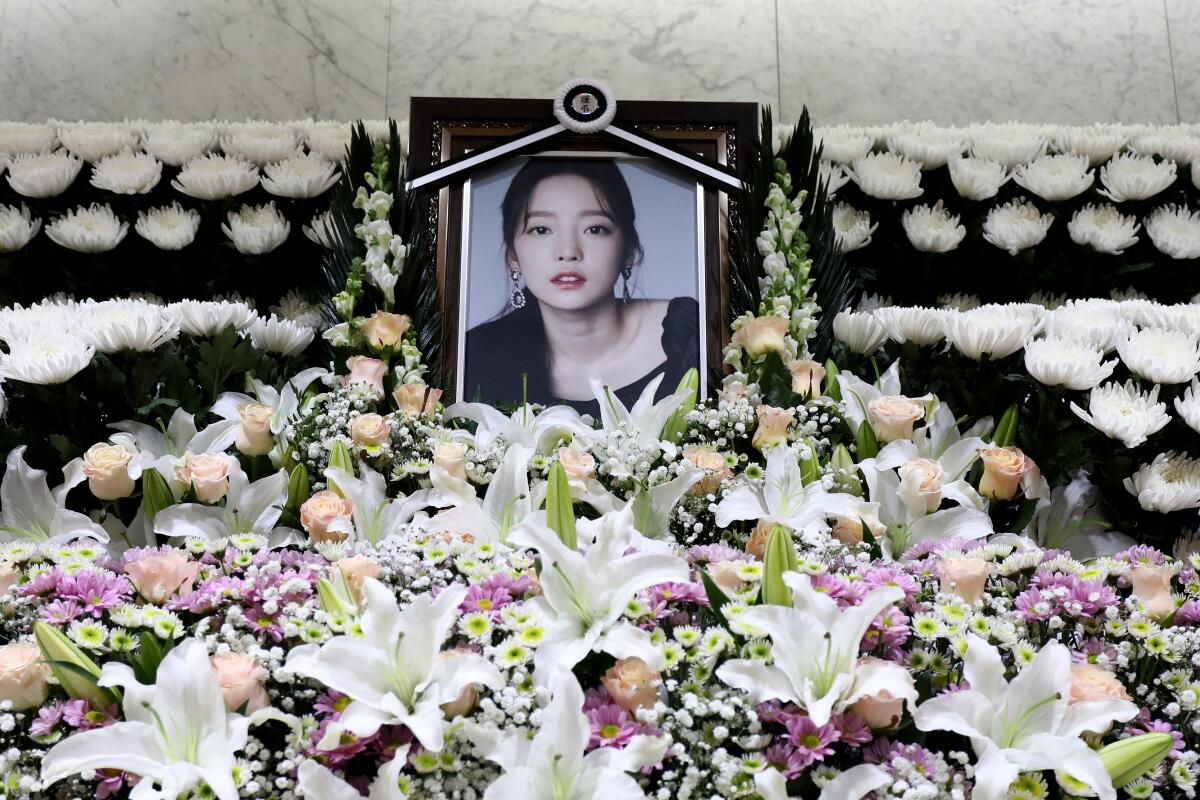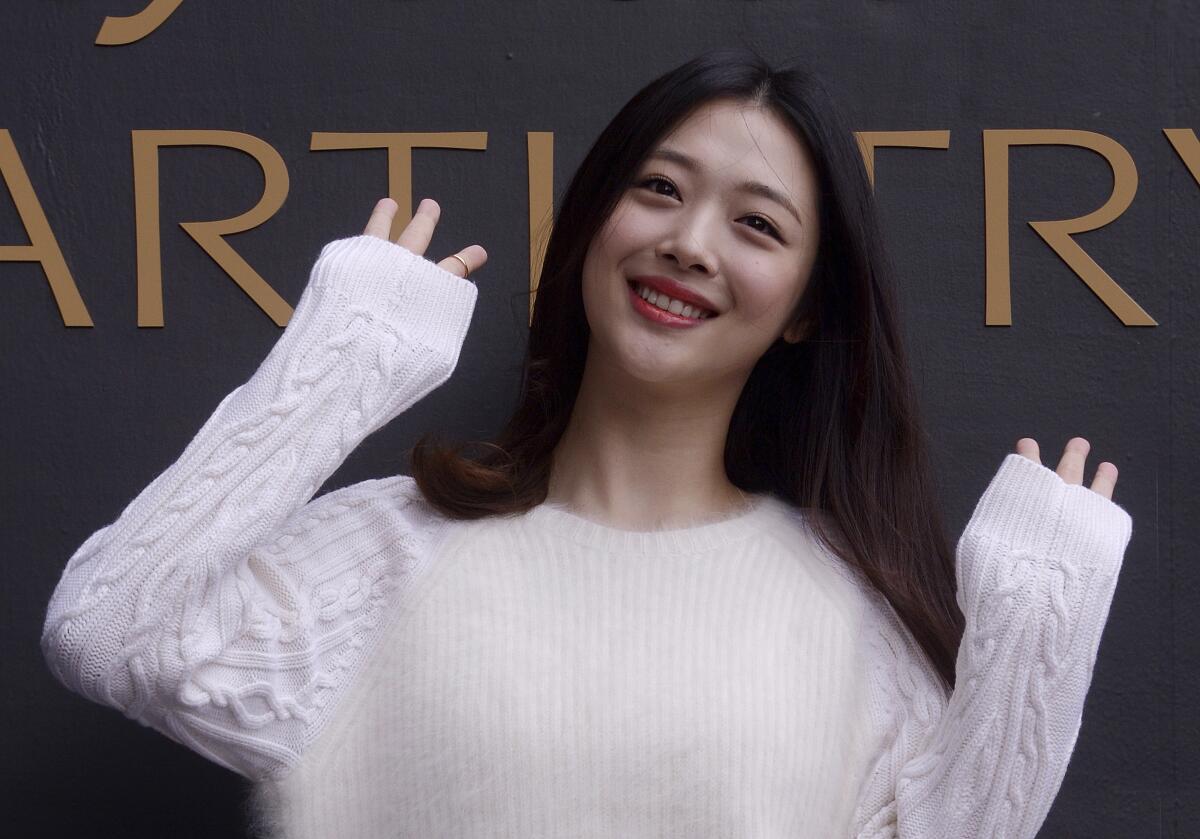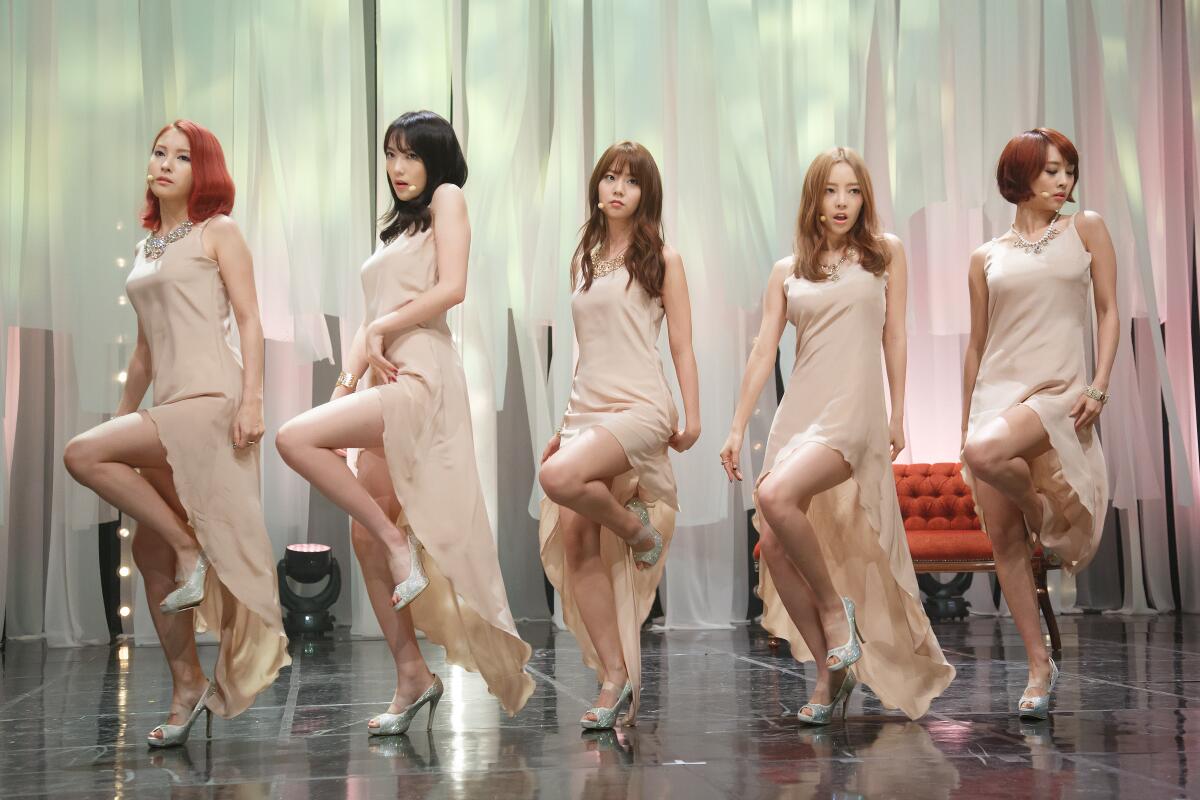They grew up in the K-pop limelight. Is it to blame for their deaths?

- Share via
SEOUL — By most measures, the young women weren’t exactly radical.
Sulli didn’t like wearing bras. She found them constricting and felt more natural without one. She considered it her choice to appear in public without one if she felt like it.
Goo Hara defended herself against online harassment about a plastic surgery procedure to correct a drooping eyelid, and against an ex-boyfriend’s threat to go public with explicit images of her. On social media, she wrote in Korean: “I need to speak up for myself, and say I have nothing to be ashamed of when I have nothing to be ashamed of.”
As two of the biggest stars of K-pop, the meticulously produced, highly choreographed South Korean cultural export with legions of fans around the world — they saw their every word and action broadcast and picked apart.
The women took their own lives within the span of a few weeks this fall, according to police, after each had been at the center of a maelstrom of media coverage and online commentary about their personal lives.
K-pop is reeling from suspected suicides by beloved performers in recent years, as others in the industry are quitting or suspending their careers citing mental health struggles. Some of them had been subject to the most intense scrutiny and harshest backlash for being young women who step outside the idealized roles circumscribed for them: those speaking their minds, expressing their sexuality, daring to even hint at being a feminist.
Sulli and Goo’s deaths resonated with fans everywhere — but especially hit home with South Korean women, for whom the stars were rebels for their subtle subversions in an industry built on school-girl outfits and barely there skirts and largely controlled by men.

“If a man speaks up, it’s considered standing up for his own convictions, and if a female idol speaks up, it’s considered ‘attention seeking’ and met with a flood of criticism,” an editorial in the South Korean daily Hankyoreh noted after Sulli, whose real name was Choi Jin-ri, was found dead in her apartment Oct. 14 at the age of 25. “It’s undeniably deeply linked to a popular culture that views young female celebrities as ‘dolls’ or ‘sexual objects’ to be consumed. In that respect, Sulli was special ... She wanted to live as a free woman without paying attention to how people see her.”
Six weeks after Sulli’s death, Goo was found dead in her home. She was 28.
Both women had entered the K-pop industry as teenagers.
Sulli was 15 when she started performing as a member of the five-girl group f(x), and Goo just 17 when she made her debut as part of the band Kara. Each was a product of a years-long training system run by management agencies, in which teenagers are trained and groomed to be molded into stars known as “idols” to sing catchy pop tunes and perform elaborate, synchronized dance routines.
The factory-like assembly line system of stars emerged in South Korea in the 1990s, taking cues from boy- and girl-bands popular in the U.S. and the U.K. at the time but industrializing it to ensure a reliable supply of newer, younger stars when a group’s popularity wanes. Droves of aspiring stars auditioned to join the ranks of the top agencies. By the mid-2000s, the companies began perfecting the groups as commodities at home and abroad, aggressively targeting the Chinese and Japanese markets and gaining popularity around Asia, while attempting to make inroads into the U.S. market.
The K-pop system of producing the music, training the would-be stars in everything from language to dance to vocals and then managing their careers, all in-house, means much of the industry is based on control of the talent — not only of the groups’ music, dress and performance, but of the stars themselves. Each trainee is a company asset in which hundreds of thousands of dollars have been invested. (As a 2018 newspaper headline put it: “One well cultivated idol group is better than 10 publicly listed companies.”)
Many companies forbid their trainees and new pop stars from dating or even having personal cell phones, and often require that they live together in company housing.
Lee Jong-im, who interviewed half a dozen current and former K-pop trainees for a book on the K-pop system, said the trainees she spoke to appeared to struggle emotionally from the anxiety and uncertainty of whether they were ever going to make it. They felt without any recourse for those emotions because they were cut off from friends and family and utterly dependent on their management agencies. Even as she was speaking to them, their phones were pinging with messages from their managers asking about their whereabouts, she said.
“They’re not given the opportunity to formulate their own identities,” said Lee, a lecturer on media studies at the Seoul National University of Science and Technology. “Because they’re at the center of intense attention from the public, they’re never given the time to recover from and overcome emotional pain.”
Ryan Jhun, a veteran K-pop producer and chief executive of the entertainment company A Team, said that while he saw the pitfalls of the system, the industry has little choice but to carefully manage how its stars are perceived because it is dependent on the whims of fickle young fans.
“Their image is their living, so their agencies put on restrictions,” said Jhun, who manages the careers of two idol groups. “They look at them as a product.”
When it comes to “girl groups,” the images crafted by the labels are either innocent and pure or hyper-sexualized, designed for commercial appeal with little input from the stars themselves. The objectification leads to skewed perceptions of the stars from fans, said Hwang Hyo-jin, a columnist who has written extensively about K-pop idol groups.
“Many male fans seem to think, they themselves are responsible for the star’s success since they rely on the fans’ love and money,” she said. “Whether it’s not wearing a bra or dating, there’s a discomfort to seeing these stars as a being with personal desires capable of expressing their own opinions.”
As K-pop is going from a novel curiosity on the international stage and becoming an established cultural force and multi-billion-dollar business, a generation of those stars is dealing with the aftermath of having been put through the grueling system.
Park Cho-a quit the group AOA in 2017 after five years, saying she was struggling with insomnia and depression. Later that year, Kim Jong-hyun, of the group SHINee, died by suicide, leaving a note that said: “I’m broken inside. The depression that slowly ate away at me eventually swallowed me whole.”
On Wednesday, 22-year-old Kang Daniel of the group Wanna One said he was taking a break from his career because he was suffering from depression and panic attacks. On his fan site, he had posted that he was struggling with online attacks and rumors, saying: “I hope somebody saves me.”
“The industry is incredibly glamorous but is in many ways optimized to cause emotional trauma and hurt for the people in it,” Park Sang-hee, a former idol star-turned-mental health counselor, said in a 2017 radio interview after Kim Jong-hyun’s death. “There’s incredibly high expectations and harsh reprimand when you fail to meet it by even a little bit.”
Sulli was one of the few stars to directly flout the stringent norms. She openly dated, freely lived her life and flippantly retorted on social media to hateful comments she felt were unfair. In 2015, she quit the group f(x).
“I did what I was told but wasn’t even sure why I was doing it. And then, at some point, it occurred to me, ‘Why am I doing this thing?’ ” she later said on a reality TV show about leaving the group.
For those choices, she was subject to vicious online attacks and endless negative media coverage.
“It may be unintentional, but by simply nonchalantly living her life, she’s facing up against South Korea,” South Korean magazine IZE wrote in a 2016 article on Sulli, under the headline “Bad girl can go everywhere.” “Sulli’s actions and the response to it makes it embarrassingly explicit how South Korean society perceives women.”

Goo had also been subject to a deluge of online harassment beginning at a young age for openly dating another K-pop star. In recent years, most of the attention she received wasn’t for her performances or music but for an ugly, public spat with an ex-boyfriend who had threatened to release explicit photos and video of her. The man, Choi Jong-bum, received a suspended prison sentence in August for blackmailing Goo and physically assaulting her during a fight.
After Sulli’s death, Goo, who was a close friend, had tearfully bid farewell and told her: “Take care over there, live the way you really want to.”
Kim Yoon-ha, a music critic, said she saw in Sulli and Goo a reflection of the misogyny prevalent in South Korea.
“Korean society has a pathological tendency to control and obsess over women’s private lives, about their dating, marriage and sexuality,” she said. “It was the perfect collaboration of the vicious online comments and the media that callously echoed that commentary.”
Sulli’s suicide prompted one major South Korean search engine, Daum, to disable comments on all entertainment news articles in late October.
In the spring, Sulli posted a quote on Instagram from former IBM Chief Executive Thomas J. Watson, signaling she had no intention of caving to pressures to be any less outspoken.
“Follow the path of the unsafe, independent thinker. Expose your ideas to the dangers of controversy. Speak your mind and fear less the label of ‘crackpot’ than the stigma of conformity. And on issues that seem important to you, stand up and be counted at any cost.”
More to Read
Sign up for Essential California
The most important California stories and recommendations in your inbox every morning.
You may occasionally receive promotional content from the Los Angeles Times.











